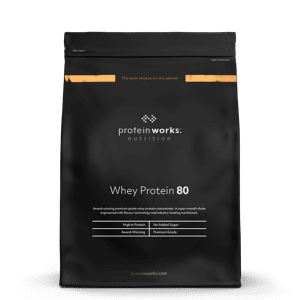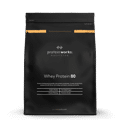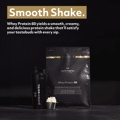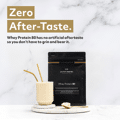FREE DELIVERY OVER €60+ | DELIVERY FROM €4.99
Whey Protein 80 (Concentrate)
- Active Ingredients:1
- Texture:Silky Smooth
“Hands down the best protein powder I've ever tried. Mixes well and tastes even better!” - Matt*
Order in next 22h 46m 45s and get on the next despatch!
Premium Pure Protein Shake.
Best Tasting Flavours
Choose from our range of incredible flavours, combined with an ultra smooth texture, for the best-tasting shakes on the market today.
Up to 22g of Protein per Serving*
A single shake contains up to a massive 22g of pure protein. It’s also rich in essential amino acids - the building blocks of life.
The Ultimate Body Fuel
From muscle repair to helping you feel fuller for longer, Whey Protein 80 can be consumed as a shake or used in baking.
- Up to 22g protein per shake
- Essential amino acids
- From 111 calories per serving
- Instant mixability
- No added sugar
- Low in fat
- Zero after-taste
- Smooth and creamy texture
- No grittiness
- Delicious flavours
What's in Whey Protein 80?
A single serving contains up to 22g of protein, 2.1g of carbohydrates and 111 calories per serving. Containing high protein content and rich essential amino acids, Whey Protein 80 helps to support the growth and maintenance of muscle mass, helping you reach and maintain your fitness goals.
Whey Protein 80 is a natural a food source that has been a staple in people’s diets for centuries. Research has shown that grass-fed milk contains more linoleic acids and higher omega-3 fatty acids than milk from cows confined to indoor rearing. With our Whey Protein 80, you can rest assured that you are getting the purest and most natural whey protein possible.
It's the ultimate protein shake to boost your protein intake any time of the day. For optimal results we recommend consuming within one hour of your workout. This is known as the 'golden hour' when your body and muscles are starting to repair. Whey Protein 80 delivers incredible properties to boost your protein intake and satisfy your cravings in a healthy and delicious way that is high in BCAAs, low in fat and low in cholesterol. It's perfect for those following a calorie-controlled diet. As always, we recommend using our products in conjunction with a varied and balanced diet and a regular exercise routine.
Instant Mixability
Due to it's high-quality blend and perfect formulation, our Whey Protein 80 is easy and quick to blend. It yields a smooth, creamy, and delicious protein shake that’ll satisfy your tastebuds with ever sip.
Perfectly Sweetened Flavours
Whey Protein 80 is perfectly sweetened so you can enjoy your shake without sweetness overpowering other flavours. It’s the ultimate protein shake to boost your protein intake any time of day.
Zero-after-taste
Unlike other protein powders in the market, our Whey Protein 80 has no artificial aftertaste so you don’t have to grin and bear it as you might with other brands’ protein shakes.
Serving Size: 30g (one large 70ml scoop) of Whey Protein 80
We recommend between 3-5 servings per day of Whey Protein 80, depending upon your individual fitness goals. Add 150-220ml of water or milk in to a blender. Add one large 70ml scoop (30g) of Whey Protein 80, mix well and drink.
The less liquid you use, the thicker your shake will be, so adjust to suit your own taste.
Which Whey Protein Shake is Right For You?
100% Protein
- 21g
- 7
Whey Protein 80
- 22g
- 8
Whey Protein 360
- 21g
- 10
Whey Protein 360 Extreme
- 25g
- 14
*Values based on Chocolate Silk.
Please Note: flavour imagery is only a serving suggestion and for illustration purposes. It does not represent actual flavour ingredients.
One Shake Contains..
Full list of Ingredients & Nutrition.
Your Questions, Answered.
It depends on your lifestyle and goals, we recommend the following optimal serving times for Whey Protein 80: Immediately upon waking. 30 minutes pre workout and immediately after your workout. Before you go to bed. Any other time during the day when you require additional protein intake.
Consume any time of the day to increase your daily protein intake. A serving would be classed as 30g (one scoop) of Whey Protein Concentrate. Add 30g of Whey Protein Concentrate to 150-225ml of water or milk. Mix well and drink.
For best results we recommend that you use a decent blender rather than a shaker. Pour your preferred amount of liquid in to the blender, for one large 70ml scoop (30g) we recommend adding 150-225ml of water or milk. The less liquid you use, the thicker your shake will be, so adjust to suit your own taste. Next, drop one scoop of protein into the liquid, screw on the lid and shake well. It's not rocket science, but follow the basic principles and you'll be making great tasting shakes for years to come.
Yes, absolutely. One key benefit associated with whey protein powder, is the fact that it has been proven to help assist with strength and power due to its ability to be quickly digested and absorbed by the body. During physical exercise, the body undergoes both physical and metabolic stress, prompting various physiological changes. Whey protein provides the body with essential nutrients, including proteins and amino acids, which promote an anabolic state, facilitating muscle growth and the repair of lean muscle tissue.
Yes, no problem. We recommend you always check serving instructions on each product if you plan on taking a combination. Whey Protein 80 is most commonly taken with Creatine, Pure Fine Oats, BCAA and Glutamine.
Whey Protein 80 is suitable for vegetarians, but not for vegans.
Unfortunately, Whey Protein 80 is not suitable for vegans. However, we have an incredible range of Vegan Proteins you can choose from.
Results vary depending on your diet, nutrition, training and individual body type.
What Others are Saying About Whey Protein 80
The latest reviews from our community.
98%Customer Reviews
Game Changer!
I've tried countless protein supplements over the years, but none have impressed me quite like The Protein Works 80. From taste to texture, this product hits all the right notes and then some. Let's start with the taste - phenomenal. I opted for one of their classic flavors, and it was an absolute delight. No artificial aftertaste or cloying sweetness, just pure, delicious flavor that made every sip a pleasure. But taste isn't everything, right? Fortunately, The Protein Works 80 delivers on all fronts. The mixability is fantastic; no clumps or gritty residue left behind. A quick shake in my shaker bottle and it's smooth sailing. One of the standout features for me is how light it feels. Unlike some other protein supplements that can leave you feeling bloated or heavy, The Protein Works 80 is refreshingly light on the stomach. It's perfect for a post-workout pick-me-up or a midday protein boost without any discomfort. Overall, I can't recommend The Protein Works 80 enough. Whether you're a fitness enthusiast looking for a reliable protein source or simply someone who appreciates a great-tasting supplement, this product is a game-changer. Trust me, you won't be disappointed.The Strawb and White Choc
this is the best flavour by far!Lovely Stuff
On my 2nd bag now, this stuff is greatJust what I need
This helps me get my protein in. It tastes nice and has lots of flavoursTastes good
I have been craving for some frappe these days and thought of getting this one instead as a better alternative. I do not regret this decision. It tastes very good and is such a refreshing pre-workout drink.





